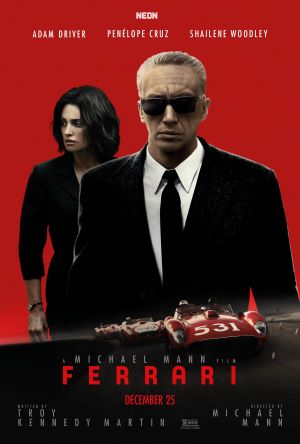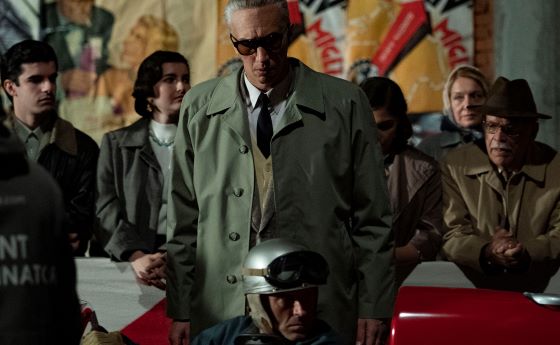

[Rating: Minor Rock Fist Down]
In Theaters Monday, December 25
How the hell do you make a movie about race cars and Ferraris and casual fucking this goddamned boring? No, seriously: how is that even possible? You’ve got Michael Mann behind the camera, the eye that launched a thousand nerdy film ships by way of urban assault bank robberies, Mohican murders, and Tangerine Dream serial killers, and this labored drama about parental grief and Catholic guilt is the best he can do? Despite the best (misguided?) efforts of the cast, and some top-tier costume and production design work, that seems to be the case, yeah.
To his credit, Mann doesn’t prevaricate or mislead the audience about what kind of movie this will be. The first scene of Ferrari shows automaker and racing enthusiast Enzo Ferrari (Adam Driver) in bed with his mistress, Lina (Shailene Woodley), who he leaves at dawn so he can return home and his wife, Laura (Penélope Cruz). From here, there’s close to 20 minutes of arguing about Enzo’s infidelity and the married couple’s shared grief over the loss of their son the previous year before any speeding cars are shown, and even then it’s just a timed lap. Set in 1957 during a particularly rough financial patch for Enzo and his boutique car company, Ferrari is about relationships and legacy: something that may disappoint those drawn to the movie by its title.
And while it’s true that the iconic automotive brand shares a name with its founder, there’s not a lot of fun or excitement in the movie whose name is synonymous with both. Mann focuses the film’s narrative on a dual crisis in Enzo’s life that sees his professional and personal dreams reach a critical point at the same moment. While his company is on the verge of economic collapse, so too is his personal life, which sees Lina pressing Enzo to formally recognize the young son she shares with him (a child the still-grieving Laura doesn’t know about). Ferrari follows Enzo’s attempts to resolve each problem with a combination of daring, deceit, and thoughtful creativity that makes for an interesting character study (albeit in a horribly paced and cast motion picture).

The biggest problems with Ferrari start with its schizophrenic tone, which bounces between earnest grief/foreboding and playful yet dark humor. Enzo is a bit of a scamp with a biting sense of humor and a roguish yet combative relationship with the press, all of which fit well with his playboy sensibilities and complicated relationship with Laura. None of this translates into the action of the narrative, however, which is clinical, unsentimental, and robbed of any joy or fun. The foreboding music by Daniel Pemberton adds to the feeling of dread running underneath the foundation of Ferrari, and while this fits with the fresh grief that undercuts every second of Enzo and Laura’s existence, it sours the mood and keeps the audience on edge throughout.
The plot thread about Enzo assembling and coaching a team to win a race that will put his company on the path towards profitability is the most exciting part of Ferrari, yet the competing drama about the love triangle and Laura’s grief over the discovery of her husband’s other son consumes most of the movie’s oxygen. The drivers integral to the success of the team in the big race, Taruffi (Patrick Dempsey) and De Portago (Gabriel Leone), get no development except for the fact that one is old and cranky while the other is young and cautious. And when the race does occur in the final 30 minutes of the total 130, it comes without any real set-up to allow the audience an idea of how things are going for Enzo’s team.

Hell: this is a movie framed by the “big race” finale trope, and right up to the moment when the winner is revealed, the audience has only a fleeting idea of who is ahead and why. And this is all aside from the fact that this is a movie about an iconic Italian man and motorcar without any Italians in the lead roles: just affected accents that would make the House of Gucci cast blush. Adam Driver, in both movies, seems not to have learned his lesson the first time, and while he isn’t bad in Ferrari, it’s a role that just doesn’t fit him or any of the other cast.
Cruz is the one true standout in this regard as a grieving mother whose sunken eyes, grey pallor, and broken posture mask a fiery resolve burning just beneath the surface, but the movie she’s in too often competes with the exciting portions of Ferrari. Laura’s journey through the mourning process and the nature of the marriage with Enzo is indeed fascinating, and reads well on-screen, yet pitting all of this against impossibly dangerous racing by way of the unbearably sexy 335 S is just not fair. One would think a film could juggle these two considerations, especially with a proven maestro like Mann running the show, but they’d be wrong.
So, yeah: Ferrari is a mixed bag of uneven performances arranged by a casting department without an atlas, hampered further still by two competing narratives that don’t play well with each other. Cruz is good, Driver is okay, and everyone else just sort of limps through a movie whose A- and B-plots probably should have been swapped. Those coming to this one looking for a fun racing movie will likely be disappointed by the oversaturation of drama, and anyone hoping for an intimate exploration of grief and intimacy will leave wondering why there was so much car crap mixed into things. And while Ferrari the man and the car seemed to be able to pull off anything, the movie bearing that same name fails to duplicate the magic.





Comments on this entry are closed.